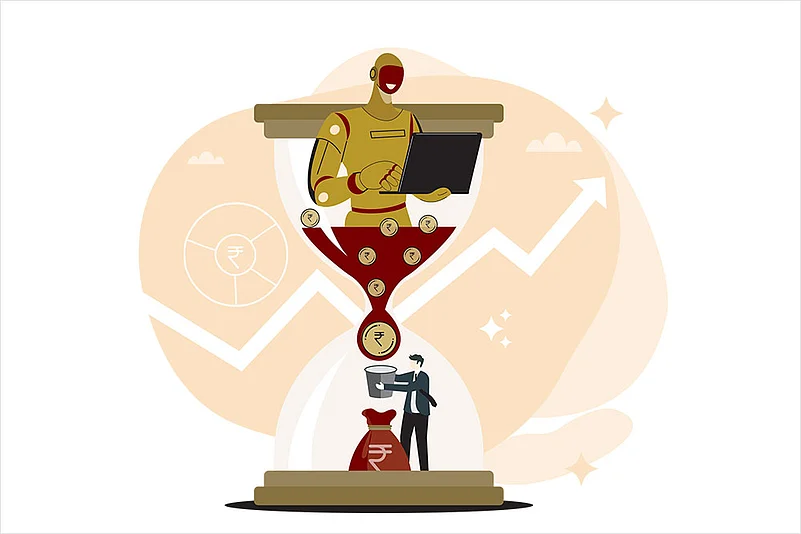When it comes to choosing a mutual fund (MF) scheme, one of the major parameters is the expertise and legacy of fund managers, a living, breathing human being you can trust your money with. For decades, fund managers have been relying on their team of research analysts, gut instincts, and market expertise to make investment calls. But, of late, AI is bringing about a change, with its capabilities of precise processing of millions of data points, which are multiplying as markets become more dynamic and globalised.
But what does this entail for the future of human fund managers? Before exploring that question, let’s look at the extent to which AI has made inroads in the mutual fund industry and how much of the fund management workload it’s sharing.
Inroads In MF Industry
The MF industry has started embracing AI, but in a measured way, treating it more as a helping hand. The objective: to create wealth with speed, accuracy, and confidence. According to Mercer’s global survey, AI Integration In Investment Management 2024, 9 out of 10 managers are either currently using (54 per cent) or are planning to use (37 per cent) AI for their investment strategies or asset-class research.
India is not far behind its global counterparts in adopting AI. When we checked with fund managers from about 20 fund houses whether they use AI in their investment management process, most acknowledged they do, at least to some extent. Among the top 10 fund houses, the majority admitted to using AI in their investment process at some level. Among major fund houses, Aditya Birla Sun Life Mutual Fund and Nippon India Mutual Fund said they do not use any form of AI in their investment process. Aditya Birla Sun Life Mutual Fund, however, said that they are in the process of learning and experimenting with AI tools.
Interestingly, most of them are using it either at the ideation or deep research levels. Says Krishna Sanghavi, chief investment officer of equity, Mahindra Manulife Mutual Fund: “AI is proving to be a valuable tool in supporting fundamental research, particularly when it comes to analysing historical data. It can help track a company’s past communications and outlook to assess consistency or changes over time, and make intra-sector comparisons far more efficient.”
Even the Securities and Exchange Board of India (Sebi) feels the need to work with emerging technology. Sebi chairman Tuhin Kanta Pandey in his address to the students of the National Institute of Securities Market (NISM) on August 14, 2025, said: “The market you will step into will be more interconnected, more tech driven, and more complex. Artificial intelligence, blockchain, algorithmic trading are not future trends, they are today’s realities.”
The Burden Of Rigour…
At first glance, fund management may seem like a numbers game—buy, sell, repeat. But peel back the surface, and you will find that each of those seemingly simple decisions requires a staggering amount of work.
What sets a successful fund manager apart is not luck or instinct, but rigorous research, disciplined approach, and the ability to make decisive calls under pressure. Their true strength lies in identifying high-quality businesses early on and having the conviction to take meaningful positions, even when market sentiment is uncertain.
When fund managers from about 20 fund houses were asked about using AI in investment management process, most said they use it to some extent
That in-depth research begins with understanding companies inside out—how they earn, how they grow, what risks they face, and so on. In addition, they also need to study the broader economy, sector outlook, shifts in consumption patterns, and assess the demand for products. All these factors play a crucial role in assessing a company’s prospects and whether it makes the cut.
Some of these facts are available in companies’ annual reports, but there are external forces that such reports do not capture. These include geopolitical tensions, changes in trade policies, or fluctuations in export-import. Each of these factors can alter an investment decision overnight. Tracking even one of these elements requires time and expertise.
Now imagine having to monitor all this information simultaneously, across hundreds of companies.
Let’s take an example to give you a sense of the complexity and effort involved in managing funds. Typically, a fund manager manages 5-7 schemes. Suppose a fund manager is in charge of five schemes with 40 stocks in each, and assuming there is no overlap among them, that would entail tracking 200 different companies, and then a few more in case some companies warrant a replacement. Now, consider the reading load: if each company’s annual report runs into about 150 pages, the manager would need to go through nearly 30,000 pages for 200 companies, not to mention the countless institutional research reports and market updates.
With fund houses adding more funds to their stables, the analysis and data crunching tasks are multiplying rapidly.

…Shared By AI
Use of AI makes the process easier and less time consuming for fund managers. “What once took weeks, or even months, can now be done in a single day, thanks to the advent of AI,” says a pharma sector analyst at a bank-sponsored large fund house, who did not want to be named. He cites the example of recent trade tariff announcement by US President Donald Trump: “Earlier, assessing its impact would take at least a week; this time, the analysis was completed within a day,” he adds.
Fund managers in India are increasingly turning to AI to sharpen their research and decision-making. AI tools are helping them sift through massive volumes of data—from corporate filings and earnings transcripts to news flow and social media sentiment—at speeds impossible for humans to achieve. “With the right prompts, AI can also summarise annual reports or offer documents to extract key points, allowing analysts to focus on deeper evaluation and build more informed projections,” says Sanghavi.
Use of AI makes the process less time-consuming for fund managers. AI tools help them sift through data which would otherwise take weeks
When asked how AI helps, the chief investment officer of one of the largest fund houses in India, who did not want to be named, explains, “It’s quite straightforward. We typically upload the annual report into our system and ask it to summarise the key points. Instead of spending hours combing through 150-200 pages, we get the essence in minutes.”
He adds: “We prompt the system to line up the management’s guidance numbers from the last quarter against the current one. AI highlights the changes which could otherwise be missed in the fine print. That tells us whether the management is becoming more conservative, more aggressive, or simply shifting gears.”
Several other fund houses told Outlook Money that they are actively looking for reliable technology partners. “We have seen the merits of using AI in our investment process, and are looking for a dependable InvestAI partner,” says the CEO of a mid-sized fund house, on the condition of anonymity.
Can AI Replace Fund Managers?
The big question here is if AI can replace human fund managers? The answer to this question is: “At least not very soon.” Use of AI in fund management is not about replacing fund managers, but empowering them to make faster, smarter, and more informed decisions.
At present, fund managers are using AI for crunching data and research though other departments such as sales, customer support and marketing are using it big time.
“AI is not making investment decisions, it just helps in making decisions,” says Kailash Kurkarni, CEO, HSBC Mutual Fund.
Another factor that weighs in favour of fund managers is the risks involved in AI. From time to time, Sebi has raised red flags over the risks associated with AI. One of the key issues is data privacy, a point echoed by several fund managers we spoke with. As a result, many are using AI only in a limited capacity and avoid relying solely on its outputs.
Sebi has also cautioned against the risk of herding behaviour, where widespread reliance on common datasets or models could cause AI-driven volatility in the markets. Therefore, fund managers are still evaluating the options before implementing AI fully in their investment process.
The Regulatory Purview
Sebi came up with its first circular in May 2019, which asked fund house to report to Sebi about the uses of AI and machine learning (ML).
In December 2024, Sebi clarified that investment advisors using AI tools remain fully responsible for their advice. They must disclose the extent of AI usage to clients and ensure data confidentiality and regulatory compliance.
In June 2025, Sebi again came out with a consultation paper, Guidelines For Responsible Usage of AI/ML In Indian Securities Markets. This paper highlights the risk linked to AI. “While AI/ML has the potential to improve productivity, efficiency and outcome, it is also important to manage these systems responsibly as their usage also creates or amplifies certain risks which could have an impact on the efficiency of financial markets and may result in adverse impact to investors,” said the paper.
It now remains to be seen when Sebi comes out with its final guidelines or circular on the use of AI in MFs, and what form these regulations ultimately take. Will they merely serve as guardrails to ensure responsible usage, or will they also provide a framework that actively encourages innovation?
The industry hopes that regulation strikes the right balance—protecting investors from potential risks, while giving fund managers the freedom to harness AI’s full potential.
If done right, this could mark the beginning of a new era, where technology not only supports sharper decision-making, but also sets new benchmarks for performance, transparency, and investor trust.
kundan@outlookindia.com













